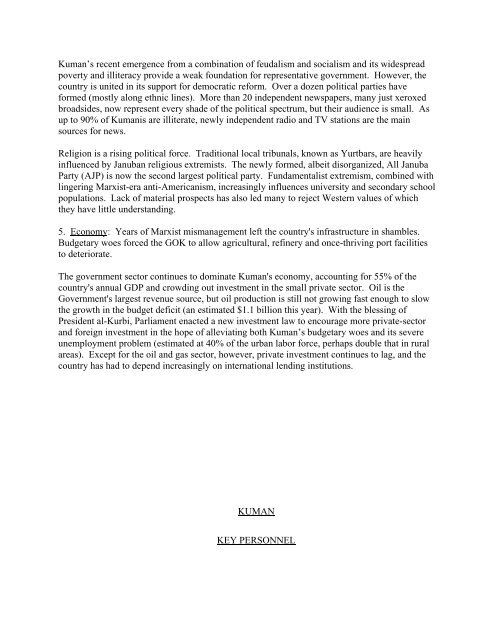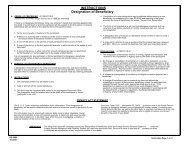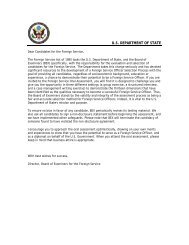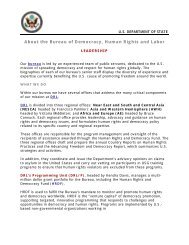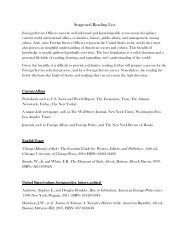Foreign Service Officer: ORAL ASSESSMENT STUDY GUIDE
Foreign Service Officer: ORAL ASSESSMENT STUDY GUIDE
Foreign Service Officer: ORAL ASSESSMENT STUDY GUIDE
You also want an ePaper? Increase the reach of your titles
YUMPU automatically turns print PDFs into web optimized ePapers that Google loves.
Kuman’s recent emergence from a combination of feudalism and socialism and its widespread<br />
poverty and illiteracy provide a weak foundation for representative government. However, the<br />
country is united in its support for democratic reform. Over a dozen political parties have<br />
formed (mostly along ethnic lines). More than 20 independent newspapers, many just xeroxed<br />
broadsides, now represent every shade of the political spectrum, but their audience is small. As<br />
up to 90% of Kumanis are illiterate, newly independent radio and TV stations are the main<br />
sources for news.<br />
Religion is a rising political force. Traditional local tribunals, known as Yurtbars, are heavily<br />
influenced by Januban religious extremists. The newly formed, albeit disorganized, All Januba<br />
Party (AJP) is now the second largest political party. Fundamentalist extremism, combined with<br />
lingering Marxist-era anti-Americanism, increasingly influences university and secondary school<br />
populations. Lack of material prospects has also led many to reject Western values of which<br />
they have little understanding.<br />
5. Economy: Years of Marxist mismanagement left the country's infrastructure in shambles.<br />
Budgetary woes forced the GOK to allow agricultural, refinery and once-thriving port facilities<br />
to deteriorate.<br />
The government sector continues to dominate Kuman's economy, accounting for 55% of the<br />
country's annual GDP and crowding out investment in the small private sector. Oil is the<br />
Government's largest revenue source, but oil production is still not growing fast enough to slow<br />
the growth in the budget deficit (an estimated $1.1 billion this year). With the blessing of<br />
President al-Kurbi, Parliament enacted a new investment law to encourage more private-sector<br />
and foreign investment in the hope of alleviating both Kuman’s budgetary woes and its severe<br />
unemployment problem (estimated at 40% of the urban labor force, perhaps double that in rural<br />
areas). Except for the oil and gas sector, however, private investment continues to lag, and the<br />
country has had to depend increasingly on international lending institutions.<br />
KUMAN<br />
KEY PERSONNEL


